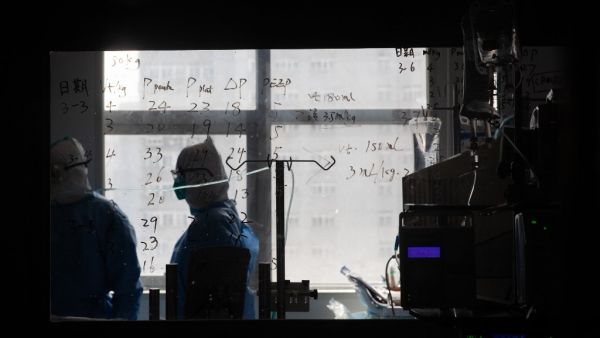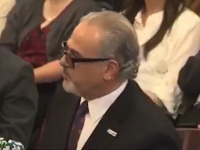As China reported on Thursday new local infections of COVID-19 for the first time since the disease emerged in its central city of Wuhan late last year, New Zealand, Australia and Britain were adopting drastic measures to stop the spread of the coronavirus within their borders.
Australia and New Zealand on Thursday separately announced they would be closing their borders to non-citizens.
New Zealand Prime Minister Jacinda Ardern said her ban would go into effect at 11:59 p.m. Thursday while Australian Prime Minister Scott Morrison announced his border would close Friday at 9 p.m.
"This will stop tourists or temporary visa holders, including students or temporary workers, from coming to or entering New Zealand," Ardern said during a press conference. "New Zealand citizens and permanent residents will be able to return and, of course, that includes the children and partners of citizens and permanent residents."
Protecting the nation from COVID-19 is the number one priority, she said, adding all of its 28 infections have been related to people entering the country.
"In no time in New Zealand's history has a power like this been used," she said. "And I recognize how extraordinary it is but we have to make decisions in the best interest of those who live here, whether they be young or old, whether they have newly arrived or permanent."
New Zealand Foreign Minister Winston Peters also raised the country's travel advisory to its highest level on Thursday, warning residents not to leave New Zealand.
"This is the first time the New Zealand government has advised New Zealanders against traveling anywhere overseas," he said in a statement. "That reflects the seriousness of the situation we are facing with COVID-19."
The country also ordered indoor gatherings of more than 100 people to be canceled, strengthening a previous order by Ardern on Monday for outdoor gatherings to not exceed 500 people.
Morrison announced his ban during a press conference in Canberra, stating 80 percent of his country's 565 confirmed infections were the result of someone contracting the virus overseas or coming into contact with someone who had.
"So, the overwhelming proportion of cases in Australia have been imported," he said.
The country has already seen a drop by about a third of foreigner travelers to the country since he ordered last week for all arrivals to self-quarantine for 14 days, a policy that will still be in effect for returning Australians.
The measure came as the nation banned non-essential indoor gatherings of more than 100 people and outdoor gatherings of more than 500 people.
The Reserve Bank of Australia also announced as part of a policy package that it slashed its interest rates to a record low 0.25 percent due to the effect the coronavirus is having on the domestic and international markets.
The bank also announced a target yield of about 0.25 percent on three-year Australian government bonds and that it will offer support to small- and medium-sized businesses through providing a three-year funding facility at a fixed 0.25 percent, among other moves.
"Australia's financial system is resilient and well placed to deal with the effects of the coronavirus," Reserve Bank Governor Philip Lowe said in a statement.
The moves came as Chinese health officials said it recorded 34 new cases of the deadly coronavirus over Wednesday but all were imported from overseas, signaling the nation worst hit by the disease may be nearing an end to its epidemic.
The nation's death toll from the infectious and deadly coronavirus edged up by eight over Wednesday to 3,245, more than a third of the 8,809 deaths that have been attributed to the virus worldwide, according to a live tally by Johns Hopkins University.
The new infections also increased its total number of confirmed cases to nearly 90,000 infections since December when the outbreak began.
However, as the virus' hold seems to be weakening on China, its grasp tightened around Europe where nearly 80,000 people have been sickened by the disease, according to data from the World Health Organization.
WHO Director-General Tedros Adhanom Ghebreyesus on Wednesday continued to urge nations to promote isolation, increase testing and treat every suspected case, calling this tactic "the best hope of preventing widespread community transmission."
"This virus is presenting us with an unprecedented threat," he said. "But it's also an unprecedented opportunity to come together as one against a common enemy -- an enemy against humanity."
Britain on Wednesday ordered all schools to close on Friday until further notice to clamp down on the spread of COVID-19.
"Fighting coronavirus and protecting the vulnerable and our [National Health Service] are the government's top priorities right now," Education Secretary Gavin Williamson said in a statement. "That's why we are asking schools, nurseries and colleges to close."
Exceptions are being made for children of "key workers" and vulnerable children, the Education Ministry said, adding that children who do not fall into either of these groups are to remain at home "with appropriate care."
The country's Ministry of Defense also put 20,000 troops on standby for deployment throughout Britain to combat the outbreak that has grown to 2,626 confirmed cases of infection.
About half of those soldiers were being held at "higher readiness" in advance of a civil emergency, the Ministry of Defense said.
"The men and women of our Armed Forces stand ready to protect Britain and her citizens from all threats, including COVID-19," Defense Secretary Ben Wallace said in a statement. "... From me downwards the entirety of the Ministry of Defense and the Armed Forces are dedicated to getting the nation through this global pandemic."
The Ministry of Health reported 103 people have died from the disease.
The announcement follows UNESCO stating Wednesday that half the world's student population was barred from class due to the virus.
The U.N. education agency said as of late Tuesday more than 850 million students in 102 countries were affected by school closures.
This article has been adapted from its original source.








